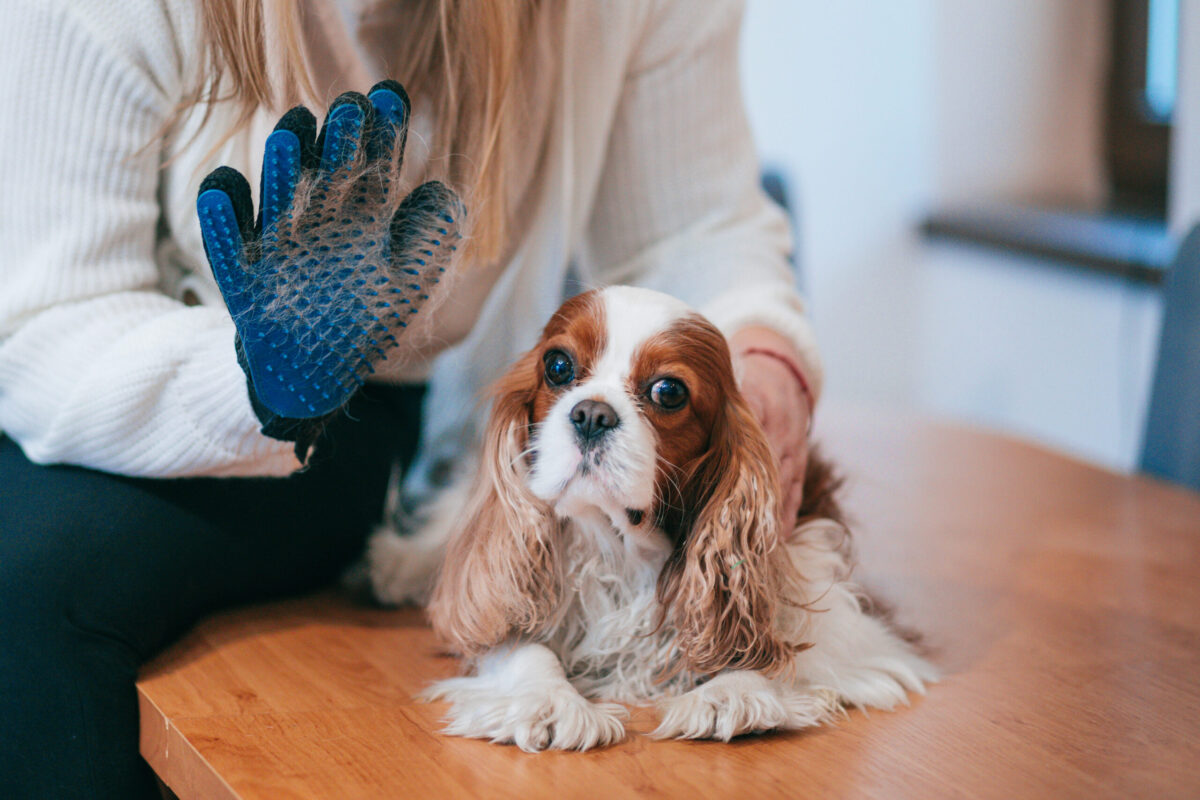A shiny coat and healthy skin for your pet is not just a beautiful appearance and something to be proud of. The condition of the skin and coat is a reflection of your dog’s or cat’s health.

Your dog’s skin – an underestimated organ of great importance
The skin is the largest organ in every dog and cat. Like every organ, it is specialised to perform important functions in the animal’s body. It forms a protective barrier against environmental factors, is involved in thermoregulation and is the main location of touch receptors.
Skin cells store water, which gives the skin its proper elasticity. The subcutaneous tissue accumulates fat, which is an essential insulating material and provides an additional source of energy used by the body in case of need.
The skin is responsible for producing structures such as fur and claws, among others. To a large extent, the quality of your pet’s coat depends on the health of its skin.
Canine coat shedding – what is it?
Shedding is the periodic replacement of hair, which is a completely natural process. Every dog ages. It usually takes place twice a year: in early spring and autumn. The rate of shedding is influenced by internal processes (diet, health and hormonal stimulation) and external factors (usually the weather and the seasons).
Taking care of your dog’s coat – why is it so important?
If the quality of your dog’s coat has deteriorated, it could mean that your dog has a health problem. A second reason could be a poorly balanced diet, resulting in your dog suffering from deficiencies in important substances for skin and coat health, such as biotin, zinc and Omega acids.
The most common hair problems and their causes
Excessive hair loss, dog dandruff, dry and dull coat or when the dog scratches itself – are the most common problems that both cat and dog owners may encounter.
Occasionally, skin changes (e.g. seborrhoea) that persist over a long period may be the result of endocrine diseases such as allergies or hypothyroidism in the dog.
The most common causes of excessive hair loss include these factors:
- Poorly balanced diet
- Parasitic diseases
- Hormonal disorders
- Skin allergies in the dog
Bacterial or fungal infections
Behavioural disorders
If you notice worrying symptoms – consult your vet. Based on the information obtained from your dog’s nutritional history, and past medical history and after performing the appropriate tests, your vet will be able to make a diagnosis. The next step is to recommend the right diet and targeted pharmacotherapy or to include therapeutic baths. Administering vitamin supplements to support skin and coat regeneration will also help to alleviate any discomfort.
Is it worth giving dietary supplements?
If your dog’s coat loss and skin changes are due to deficiencies associated with a poor diet, you can help your pet by supplementing its diet with products that contain ingredients to promote healthy skin and coat.
The most important of these include:
- Omega-3 and Omega-6 polyunsaturated fatty acids – are the building blocks of the skin, which have a protective and regenerative effect
- Vitamin B complex – provides the skin with proper nutrition, and proper elasticity and protects it from excessive drying
- Biotin and zinc – regulate sebum secretion and reduce hair greasiness
When to support your pet’s skin and coat from the inside?
- When you give your pet a home-cooked diet or use mixed feeding and you are not sure whether your pet’s meals are well-balanced
- During periods of hair quality deterioration and coat replacement
- When the problem is dry, flaky skin in dogs, dull and brittle hair
- In cases of excessive sebum (sebum) secretion
Features of the ideal hair product for your dog
Good products for your dog’s coat contain scientifically proven ingredients that have been formulated to work together to produce the best results – look for a complex formulation that ideally supports skin and coat function. Choose products that you can be sure have been developed by specialists who have knowledge and experience in animal nutrition – this guarantees their quality and effectiveness. It is important that the product is easy to administer and palatable – by choosing one you can be sure that your pet will take it with pleasure. It enjoys the trust of veterinarians and is readily recommended by them.
